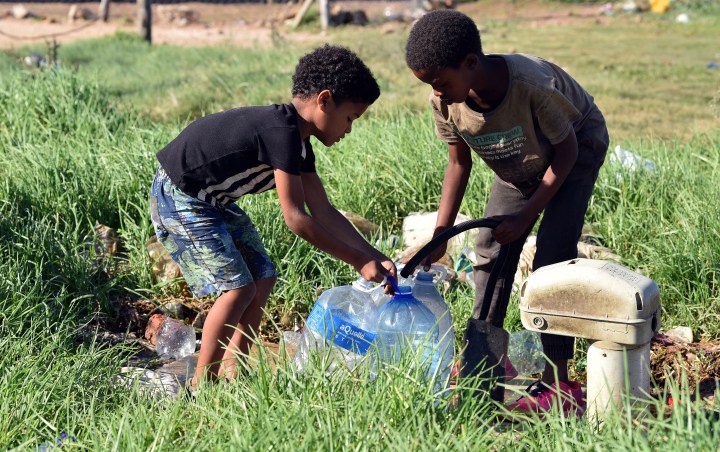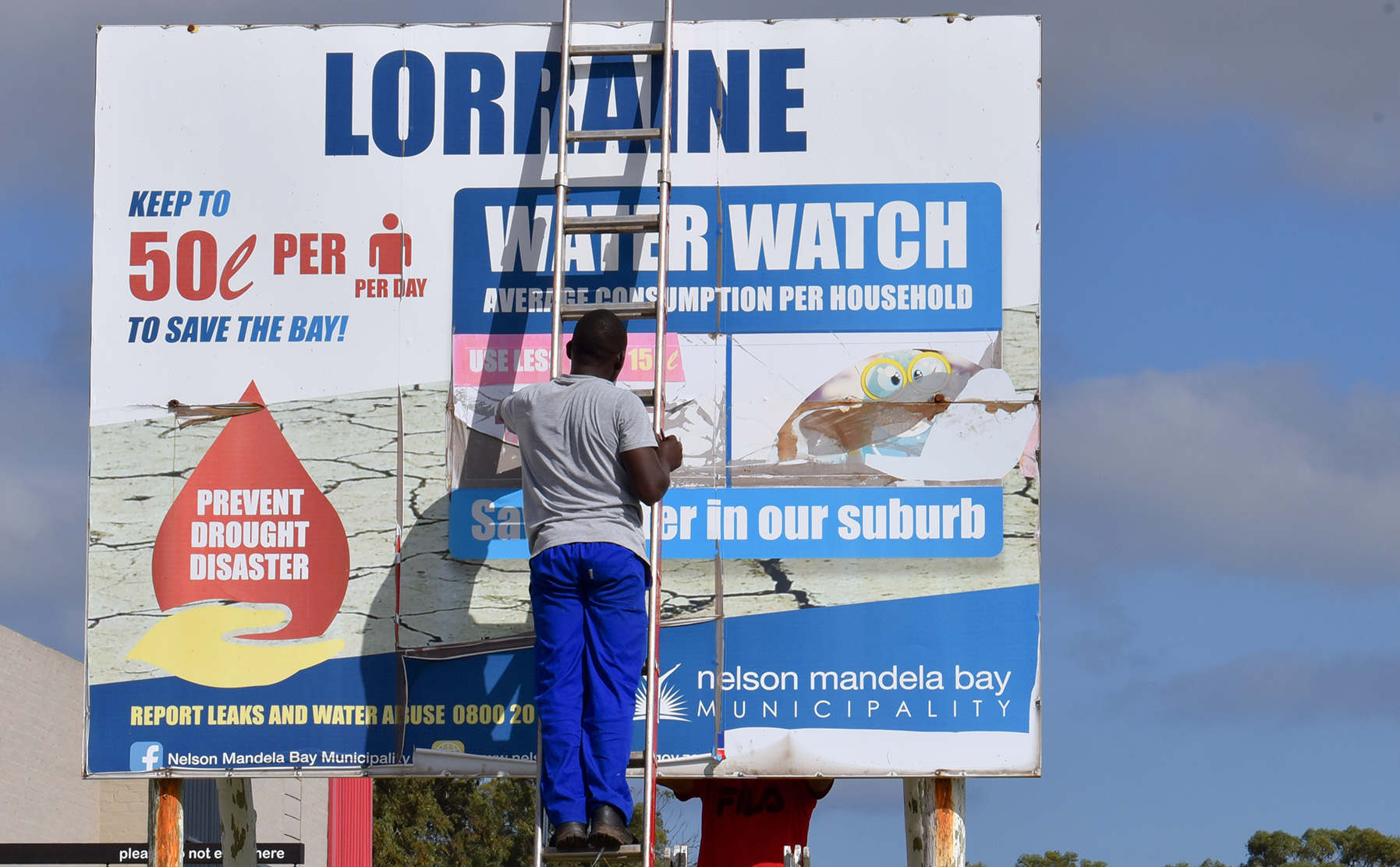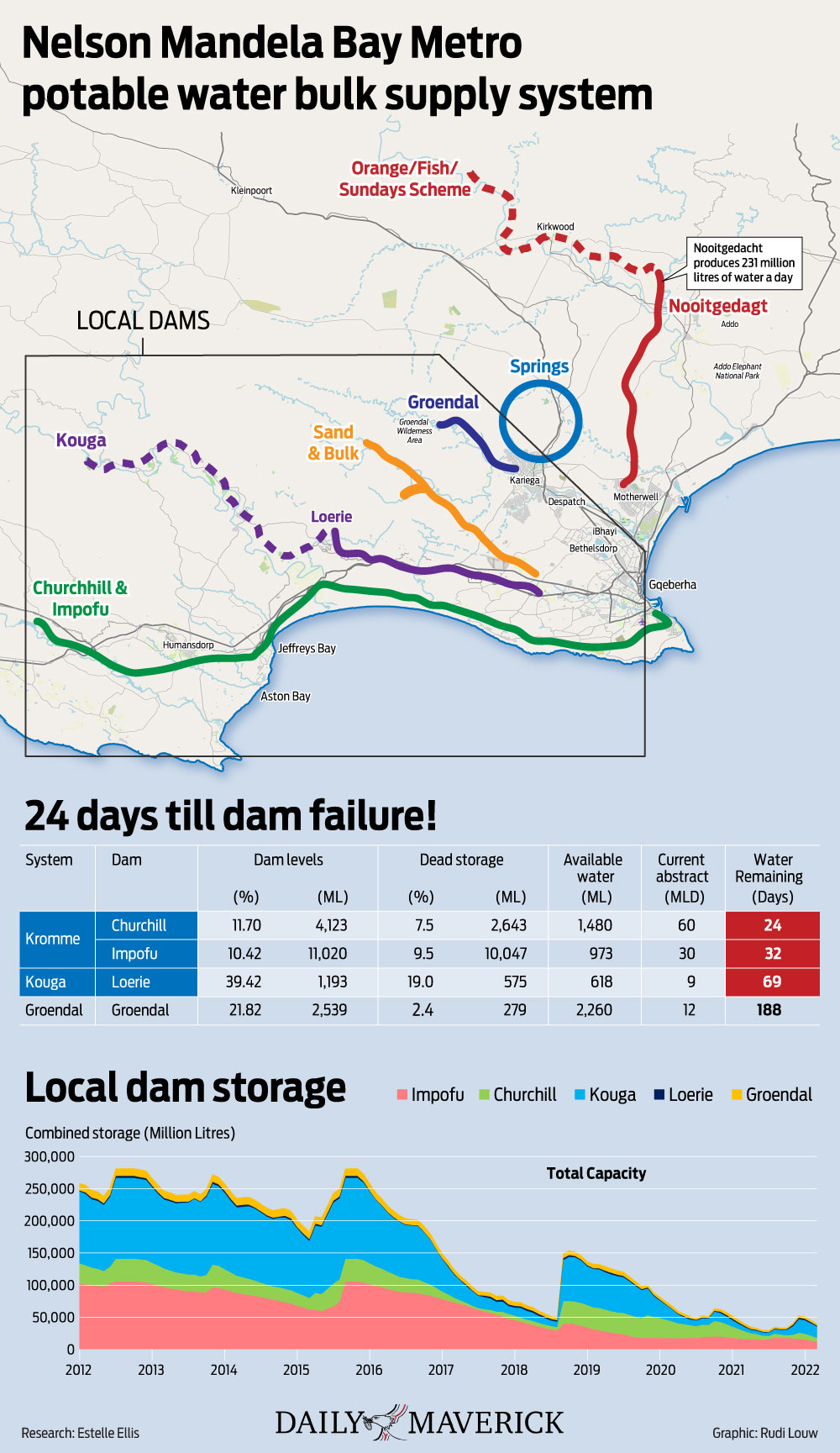In less than a month, Nelson Mandela Bay will become the first South African metro to run out of water. In an appeal and warning that is almost unimaginable, the metro’s water chief has called for prayers as the disaster moves closer, confirming that water for drinking, washing, flushing toilets and fighting fires will be severely limited. He further cautioned that drinking water may be unsafe and called on people to pray for rain.
That’s the latest estimate (made on Wednesday) of how long it will be before Nelson Mandela Bay becomes the first metro in South Africa to have large parts of it run out of water. Nelson Mandela Bay is made up of Gqeberha (formerly Port Elizabeth), Kariega (formerly Uitenhage) and Despatch, with at least R1.5-million residents.
In 24 days, from today, Friday 20 May, the first dam supplying water to Nelson Mandela Bay will fail and 11 days later the next will run dry, leaving the metro relying almost solely on water from the Gariep Dam.

This scheme, known as Nooitgedacht, is a single, load shedding-dependent system with no reserves. The Gariep Dam, on the border between the Free State and the Eastern Cape, is presently overflowing — but water supply from here will be limited and a single failure can cause chaos.
The dams supplying this mostly urban area of 1.5 million people have only about 12.4% of usable water left. Almost 40% of the metro will be without water or will have limited water.

While no official figures have been released, this is likely to immediately affect hundreds of thousands of people. When the city’s water boss spoke of the water crisis to the people of Nelson Mandela Bay, he implored them to pray for rain.
It seems to be the only hope.
It is estimated that 107 suburbs, townships and areas in the metro will run out of water within a month, when access to the dams is lost. These areas include some of the metro’s most densely populated areas — and besides the consequences for fresh water for household use, the impact on the sewage system will be catastrophic.
Municipal officials are counting on the public to restrict their water use to 50 litres per person a day so that access to some water from the dams can be retained, as two pump stations that will increase capacity will be completed only in September, as will borehole projects to amplify the available water.
But political instability, lack of leadership, the Covid-19 pandemic, persistent and debilitating load shedding and steep fuel price increases might stand in the way of the metro’s strategy succeeding, said sociologist Deon Pretorius.
The metro is in the seventh year of harsh and devastating drought and in January recorded its driest month yet.
The South African Weather Service’s Garth Sampson said the prospects for good rain before September were “the worst” he had yet seen. However, some rain is predicted for the city’s catchment areas at the weekend. Sampson said it would be significant and that between 20mm and 30mm of rain was expected in the main catchment area of Nelson Mandela Bay’s dams.
The area needs about 50mm to 100mm of rainfall in a short time to move out of danger.
Welcome rain fell in Nelson Mandela Bay on Thursday. The catchment area for the dams received some rain. Sampson said 6 mm fell in Joubertina, 3 mm in Gqeberha, 5 mm in Kareedouw and 9 mm in Patensie where the Kouga dam is situated. Sampson said more rain was expected overnight.
 Two of the main supply dams to the metro, the Impofu Dam and the smaller Churchill Dam, both in the Kromme River System, had only 26 days of water left on Wednesday — and the metro has already exceeded the allowable quota of water it can take from the Kouga (33 days to failure) and Loerie dams.
Two of the main supply dams to the metro, the Impofu Dam and the smaller Churchill Dam, both in the Kromme River System, had only 26 days of water left on Wednesday — and the metro has already exceeded the allowable quota of water it can take from the Kouga (33 days to failure) and Loerie dams.
The Nooitgedacht Water Scheme, bringing water to the metro from the Gariep Dam in the Orange River, can provide only 210 megalitres (210 million litres) of water a day to the city, which at present uses 270 to 280 megalitres a day. As a result, the densely populated neighbourhoods and areas “at the end of the pipeline” will run dry if this water must be divided among everyone.
The city’s water and sanitation boss, Barry Martin, said during a public meeting last week that they were in a race against time to keep supplying water to major industrial areas to avoid a “lockdown situation” where people can no longer go to work.
Nelson Mandela Bay, a metro consisting of the city of Gqeberha and the towns of Kariega (formerly Uitenhage) and Despatch, is home to major players in the motor vehicle industry.
Martin issued a grave warning that water for drinking, washing and flushing toilets would be scarce and that the city’s ability to fight fires “will be compromised”. He said water quality would be low and residents would have to boil water before using it.
Martin said the metro had six water supply systems, with the city getting 60% of its water from the Nooitgedacht system. This system brings water to the metro from the Orange River. A small section of the city is served by the Sand and Bulk River dams and this scheme is more than 100 years old.
The small Groendal Dam supplies water to Kariega. A part of the town gets its water from natural springs.
Historically, the metro received its water from the Churchill and Impofu dams, boosted by supply from the Kouga Loerie system, which is shared with the agricultural community.
The prognosis is dire.
“We will run out of water in the next four to six weeks,” Martin said.
Special barges had to be bought to extract water from the Impofu Dam, where levels had dipped below 16% — beneath the inlet tower of the dam.
“The next four to six weeks will be critical to see how we can ride out the water shortage until the rains come,” Martin said. “We are in the worst position we have been in 20 years.”
The region’s dams were last full in 2015 and the last significant rainfall was in 2018.
“Drought is not unfamiliar to this region,” Martin said. The last major drought stretched from 1982 to 1994.
Martin said the volume of water that could be extracted from the dams had to be reduced by 30% — and there were only 220 million litres of water available to Nelson Mandela Bay each day.
“But our average water consumption has never been close to that, ever,” he said.
The city uses about 280 million litres of water a day and has been doing so for the past six months. Once access to the dams is lost, Martin said, the metro would have 231 million litres of water available each day from the Nooitgedacht system, to be shared among all residents.
“We will be 50 million litres of water short every day,” Martin said. On Tuesday the Metro used 55 megalitres too much.
He said the metro’s water system had been heavily affected by load shedding, vandalism and theft. In April alone, the city lost thousands of litres of water when an air valve was stolen from a major pipeline. Soon after that, the Loerie Water Treatment Works went offline because of cable theft.
Martin said there is no spare capacity in the metro and all its pumps are used all the time. If a pump breaks and needs to be repaired, large parts of the city are left without water.
Quick facts about Nelson Mandela Bay’s water crisis
The municipality has warned residents about water quality.
Water tests are usually carried out monthly, but the city said it is now testing several times a day. None of these results has been made public.
Children were sent home from school to access water in January when taps went dry for 10 days.
Scenario planners foresee economic impacts similar to that of Covid-19 in Nelson Mandela Bay.
“Pray for rain so that the heavens may open,” he said, begging residents to do all they can to save water “in the spirit of ubuntu”.
“We are going to have to queue for water,” Martin said, addressing the only public meeting organised by the municipality to address the water crisis.
He said they were not considering water shedding at the moment, but were planning to introduce water collection tanks and water collection stations.
“We will need 50 to 100 trucks. We are concerned that water quality will be compromised. We will have to issue a boil-before-drinking notice as a matter of precaution.”
He said they feared that water trucks could be hijacked and drivers attacked. The other option was the construction of water collection points, since “the Nooitgedacht scheme won’t save us”
Source
Language of the news reported
Copyright © Source (mentionné ci-dessus). Tous droits réservés. Le Land Portal distribue des contenus sans la permission du propriétaire du copyright sur la base de la doctrine "usage loyal" du droit d'auteur, ce qui signifie que nous affichons des articles de presse pour des fins d'information non commerciales. Si vous êtes le propriétaire de l'article ou d'un rapport et que vous souhaitez qu'il soit retiré, s'il vous plaît nous contacter à hello@landportal.info et nous le supprimerons immédiatement.
Divers articles de presse liés à la gouvernance foncière sont publiés sur le Land Portal chaque jour par ses utilisateurs, à partir de diverses sources, telles que les agences de presse et d'autres institutions et individus, ce qui représente une diversité de positions sur tous les sujets. Le droit est à la source de l'article; la Land Portal Foundation n'a pas le droit de modifier ou de corriger l'article, ni d'endosser son contenu. Pour apporter des corrections ou demander la permission de republier ou toute autre utilisation de ce contenu, merci de contacter le titulaire du droit d'auteur.
